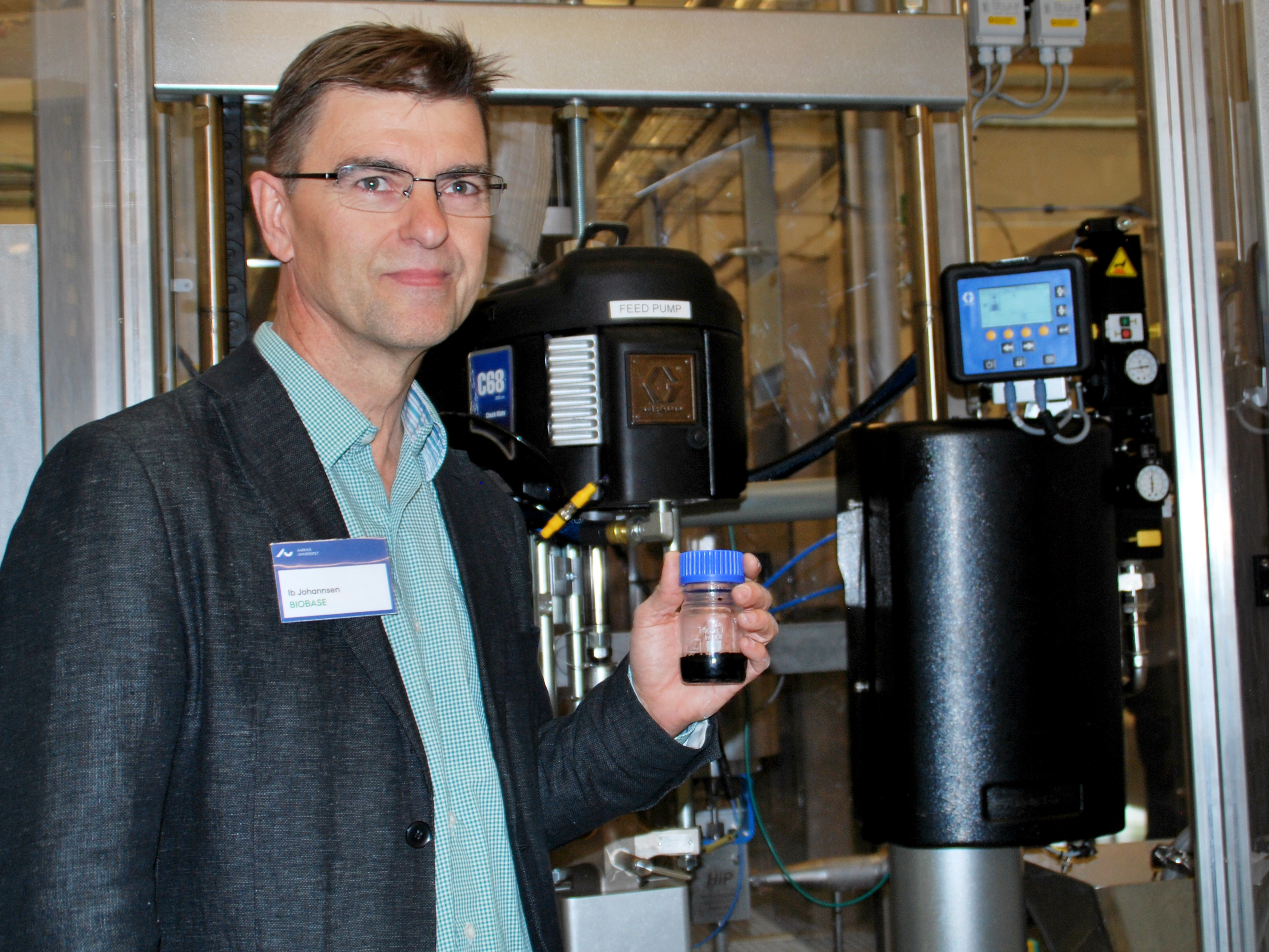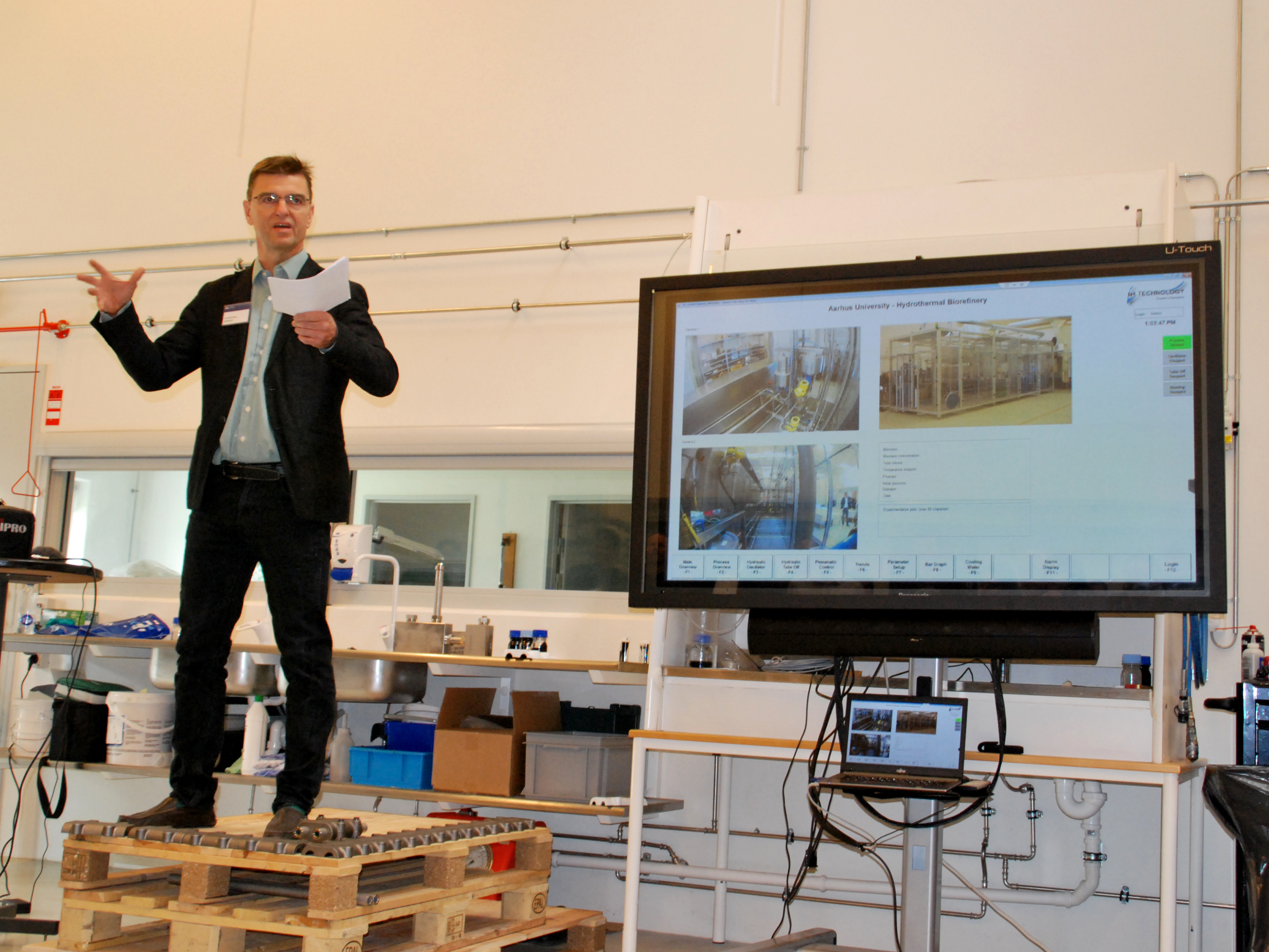The first bio-oil produced in Foulum paves the way for a green conversion in agriculture
A new groundbreaking energy facility at AU Foulum can produce oil from grass that is first used as a protein feed for pigs and poultry. This paves the way for far more productive and environmentally friendly cropping systems for both conventional and organic farming.




Alongside more than 100 guests, happy researchers at AU Foulum celebrated on Friday 22 May 2015 the inauguration of a new HTL experimental facility which can produce oil from grass and other green biomasses.
Combined with a prospective pre-processing facility, which will extract protein from the grass first, it will lay the groundwork for entirely new cropping systems for both organic and conventional farms. It will not only supply CO?-neutral energy, but also protein feed that can replace soybean imports from South America and moreover double the yields per hectare compared with what is possible today with a lower environmental impact.
- It is nothing less than having solved the Gordian Knot, said the rector of Aarhus University, Brian Bech Nielsen at the ceremony.
In the HTL reactor, wet biomass will be converted to bio-oil under high pressure and temperature and thus mimics the processes naturally taking place below ground.
- Groundbreaking is a word that is used maybe too often nowadays, but on this occasion it’s totally apt, said Brian Bech Nielsen.
- If this system succeeds in working, we can transform grass into oil and mimic natural processes, and the amazing thing is that here it doesn’t take millions of years, but can be done in half an hour.
Both protein and energy
The HTL technology is an already tested technology. The most groundbreaking aspect of the new plant is therefore that it will be part of a bigger system. It will be combined with a facility that will first extract the protein from the green biomass, such as grass or clover, before the waste product from this – the pulp – will be used for oil production. The system will, as a whole, open up entirely new perspectives for the development of new, high-yielding cropping systems in agriculture.
- There is great demand for biomass and many customers in the shop, because there will be a need for both more non-fossil energy and more food in the future. For many years we thought of these as competing aims, but it is a misunderstanding to think of biomass as a fixed amount that we must distribute. We can get much more biomass from the same area than we do today, while at the same time gaining environmental benefits and a more sustainable cropping system, says Senior Scientist Uffe Jørgensen from the Department of Agroecology.
Yield gains and environmental gains
- If we do it wisely, we can, with other words, both produce much more and solve a whole range of the environmental problems that are giving agriculture such a headache and which can become fatal for the industry in the future if we do devise innovative solutions to improve things, says Uffe Jørgensen.
The scientists in the project expect that the yield per unit area can be doubled in the new cropping system based on green energy and protein crops, while the environmental impact can be reduced.
The environmental benefit is that much of the area under cereals can be converted to, for example, clover, which does not require nitrogen fertiliser and pesticides, is green in winter and is productive for a far longer period of the year.
The protein which is extracted from the grass before it is used for energy purposes can be used as a feed for poultry and pigs. This makes the grass and clover a good source of protein for the monogastric animals that under normal circumstances would not be able to utilise the grass fully because of the high cellulose and lignin contents.
A large number of research projects are directly or indirectly linked to the experiments with the two new plants and development of the new cropping system – including two organic, ICROFS-coordinated projects: MultiPlant and OrganoFinery (Organic RDD 2). Both projects involve the development of methods for extracting protein from grass, clover and other green crops for monogastric animals.
Further information
Associate professor Ib Johannsen
Department of Engineering - Biorefining
Phone: 21 35 60 50
E-mail: ibj@eng.au.dk